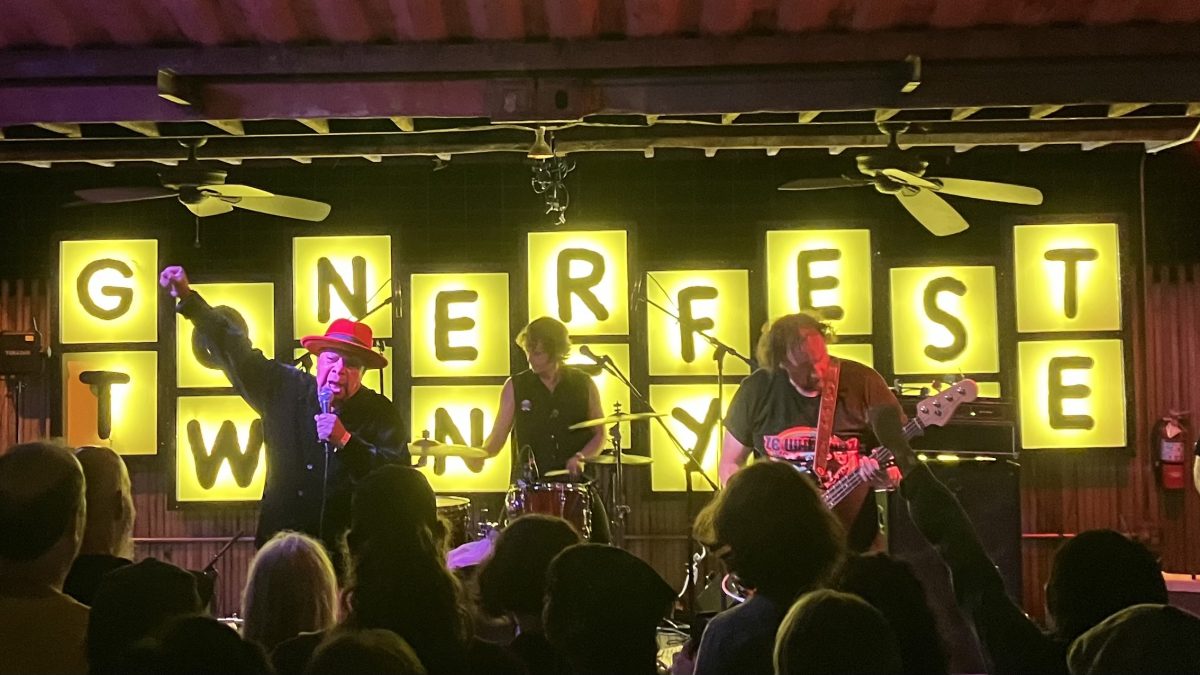It’s official: as of its closing moments this past Sunday, Gonerfest 21 has been successfully completed. Now it can drink in the state of Tennessee, the joke goes, and now it has fully embarked on its third decade. And, truth be told, it really did feel like our favorite fest had experienced some kind of growth spurt this year, even if some of its participants chose to go alcohol-free.
In fact, the common sentiment seems to be, more than ever, an overwhelmingly head-spinning “What just happened?” Perhaps that vibe was amplified because Sunday, traditionally given over to Gonerfest’s rootsier, less distorted side, was instead dedicated to very much the opposite this year, as Oneida proceeded to forge a new approach to rock music before our eyes.
Taking in all their work as a whole, Oneida excels at musical world-building, blending synth sounds with their chugging rock band foundation in an approach that’s both sonic and harmonic, noise-laden and sing-song. And they bashed out one textured tune after another. “I wanna hold your hand/Between my teeth/I won’t draw blood/Don’t wanna stain the sheets,” as one song went. But it was their finale, “Sheets of Easter,” that really took the audience to a different plane.
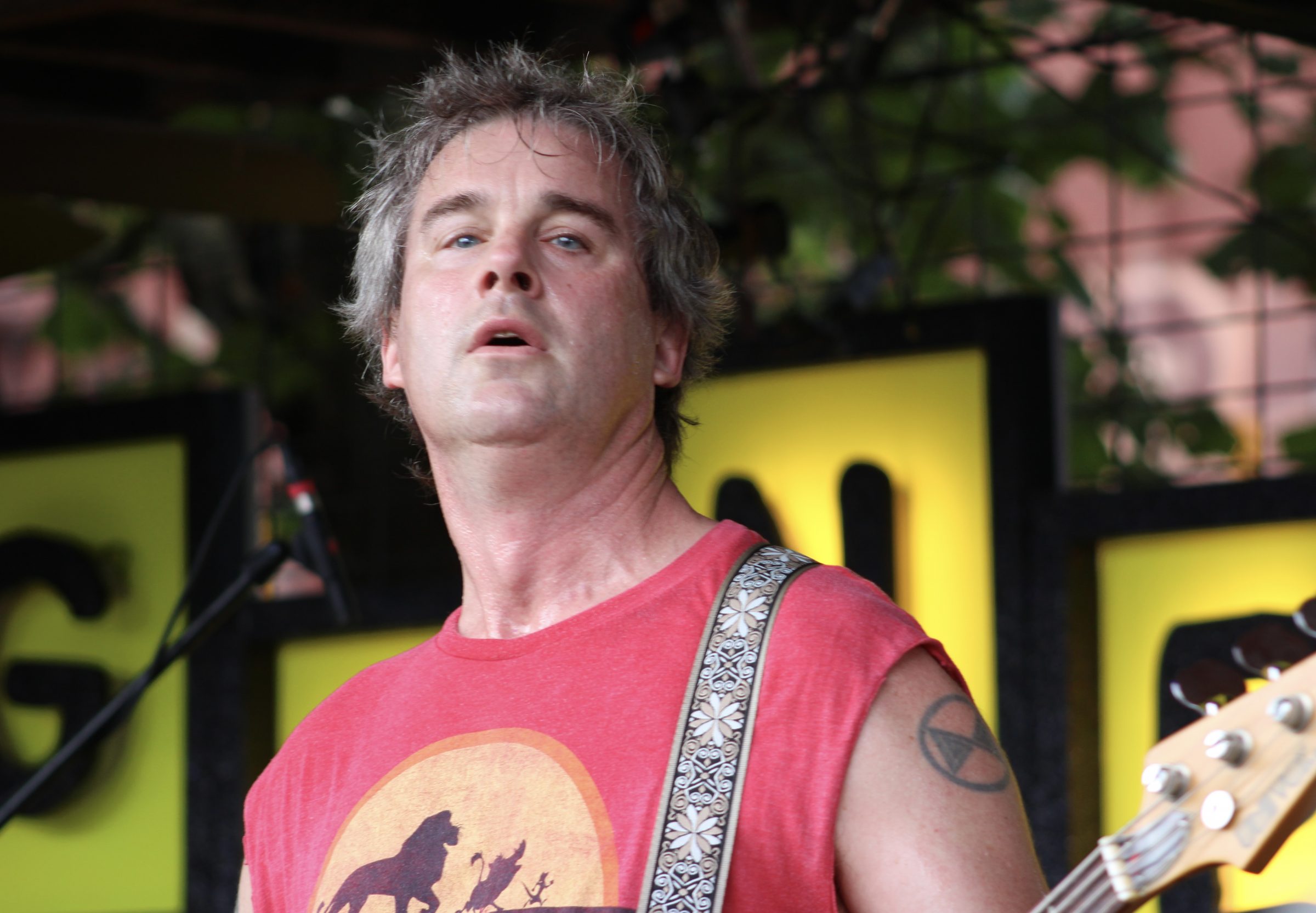
Kicking off with the phrase, “You’ve got to look into the LIGHT,” the song then consists of the band relentlessly, mercilessly repeating the last word, mantra-like, along with a single chord hammered out in eighth notes for approximately 19 minutes. “Light, light, light, light, light…” they sang, though the syllables began to morph after a while. Live stream viewers may have refreshed their connections, thinking the video was glitching. It wasn’t! Naïfs like me, unfamiliar with the song, were bewildered, amused, or offended, not knowing how or when it would end. Was it performance art? An MK-ULTRA-like experiment in which we, the audience, were lab rats? A sophomoric prank? Personally, I went through something not unlike the five stages of grief as I listened, from denial to anger, bargaining, depression, and, finally, acceptance.
It was truly one of the most surreal experiences I have had at any festival. As Zac Ives, co-owner of Goner Records, explains, the “song” is an old favorite by the band. “I don’t know how often they do it now, because it was on a record that they did 20 years ago, but it’s always insane. There’s not really much like it. Some listeners are horrified, and others are like, ‘Thank you for playing this amazing song.’ So yeah, it’s very divisive.”
Yet there weren’t many grumblers after it was done. Everyone, the band included, was too raw from the hypnotic onslaught. Finally, Eric Friedl, Goner’s founder, announced, “This concludes Gonerfest 21! After Oneida there is only light…go out into that light! Thanks to everyone who made this happen, the sound crew, the video crew. We made it through the rain, we made it through the not-rain.” And with that simple summation, the four-day roller coaster ride was over.
Looking back, then, one might well ask, “What just happened?” With too many bands to give every one of them a fair shake, one is left with only the most incendiary moments, burned into one’s brain.
The Pull Chains, a new collaboration between Greg Cartwright, Jesse Smith, Joseph Plunkett, and Eliza Hill, marked a refreshing return to harder rock territory for Cartwright, with echoes of the old Reigning Sound, but with all new material. And, as Cartwright notes, nearly every song was “a full four-way co-write from scratch, and they still seem to resonate with a single storyteller perspective. Such a joy to write songs with good people!”
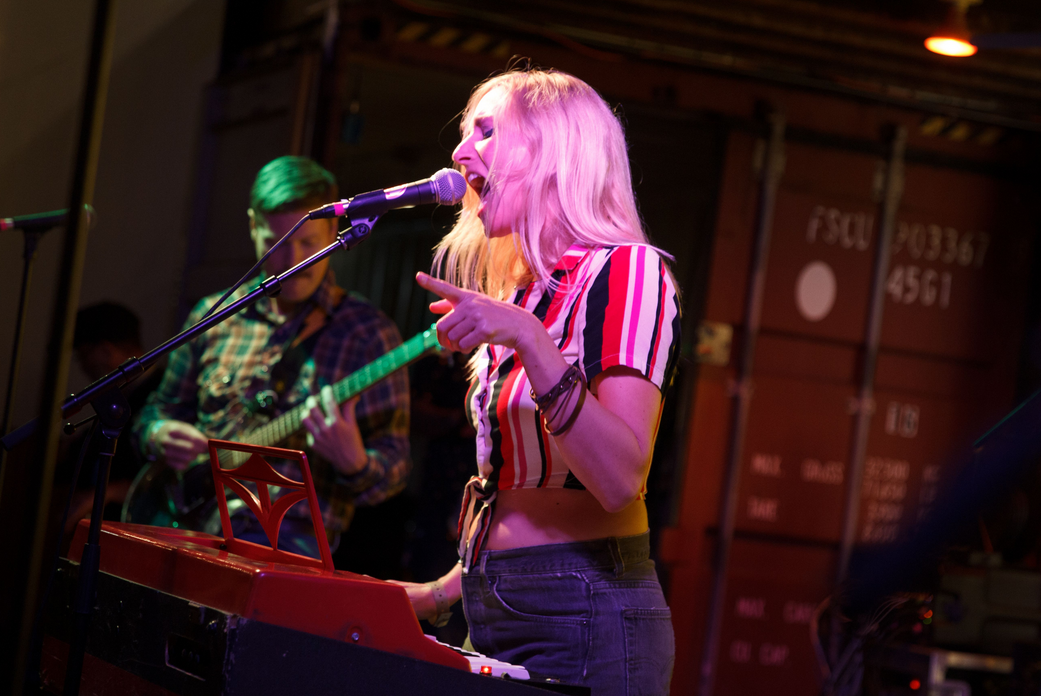
Later that day, Okmoniks singer Helene Grotans was on a tear, perhaps trying to outdo the hurricane with which she shared a name, delighting the crowd with her Category 4 vocals and frenzied-yet-precise work on the Farfisa organ. “I usually play an Acetone,” she quipped, but nonetheless praised the beauty of the onstage instrument provided by Goner with an assist from Graham Winchester. Later, she raved about the Pull Chains, saying, “The Reigning Sound is my favorite band! Well, them and the Mummies!”
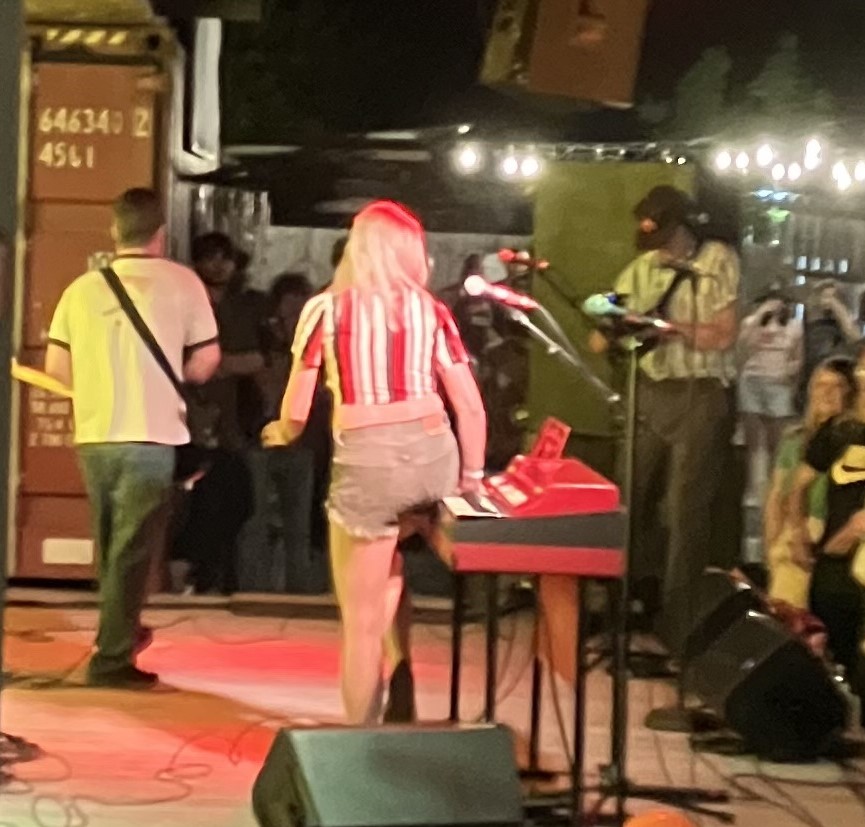
Regarding the opening night’s closer, local muso Jeremy Scott posted on social media that Derv Gordon and So What “killed it, just like they did seven years ago.” While the heavier, almost glam sound of So What contrasts with the old records by The Equals, they supplied solid backing for Gordon’s rich vocals, and, despite any audio issues Gordon encountered, had the crowd bouncing for the whole set.
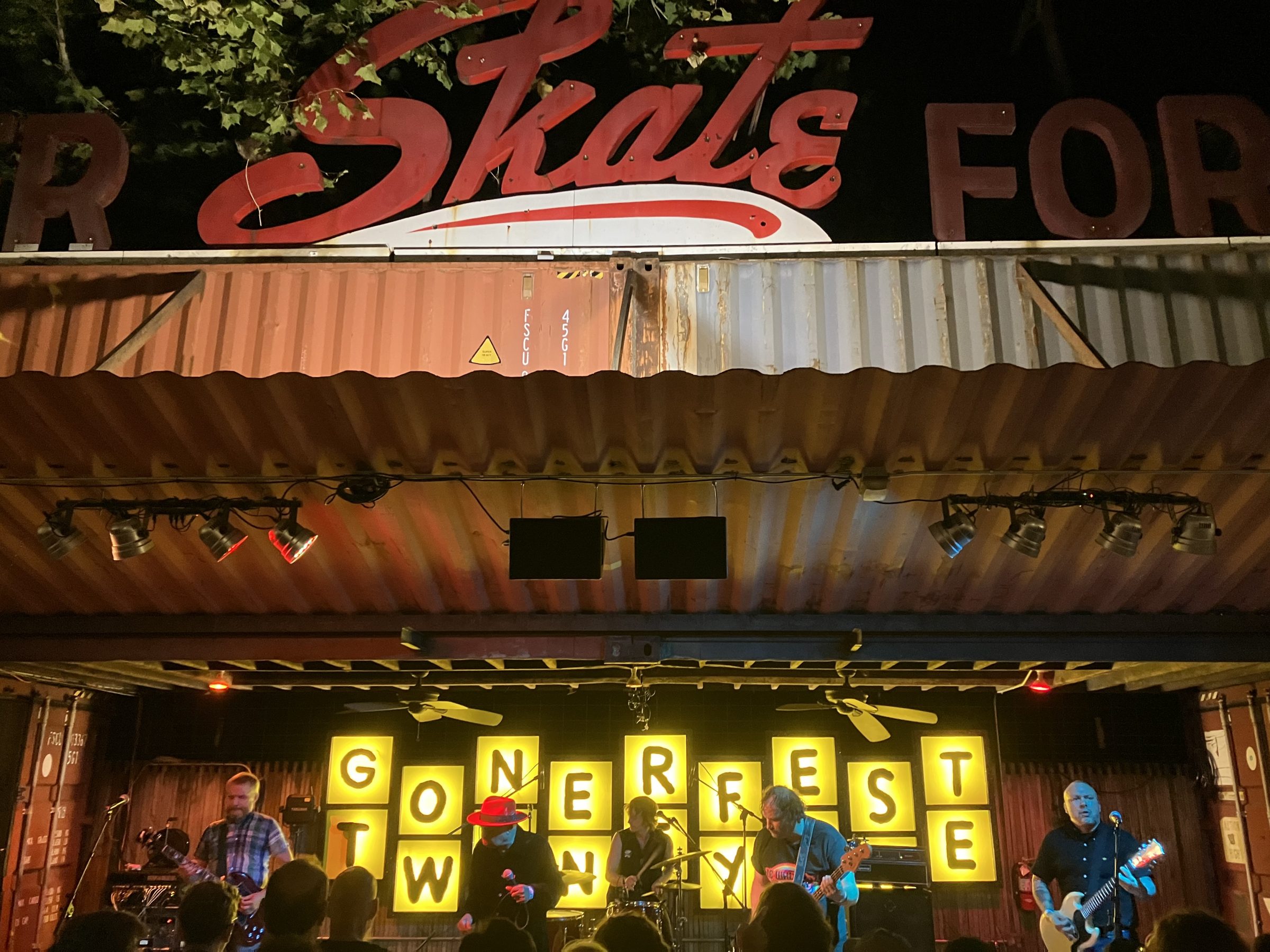
It’s Raining, It’s Streaming
Friday was marked by near-constant rainfall, but that did not slow down Gonerfest 21. As Ives notes of the move from the outdoor to the indoor stage, “We were able to deal with the rain really well on Friday, because of the team that we have with us, and GM Jeremy over at Railgarten and his staff. It took a whole lot of work from a bunch of people to be able to make all that stuff happen and pull it all off. And the community that we’re able to bring in, everybody just almost wills this thing to work well, you know? I think we’re really lucky that that it works that way.”
Railgarten, with both an outdoor and an indoor stage, offered a uniquely adaptable venue for such contingencies. And fans could also stay at home, given the reliability of the live streamed video, co-directed by Brent Shrewsbury and Alik Mackintire and executed by a crew of camera operators and other techs.
Availing myself of that option, I found the clarity of the videography and the brilliant online mix to be excellent, especially when running it through big speakers. Surprisingly, Ives himself watched some of the livestream on Sunday.
“I couldn’t be there [due to a mild case of Covid], and I was sort of crestfallen that I couldn’t. But the fact that I could sit there and watch from my quarantined house meant everything. I sent an email to Brent and Alik afterwards saying, ‘You completely saved my day.’ And not only that, that stream is an unbelievable way to watch everything. It is just on a different level now. They’re directing and cutting that stuff real time on a multi-camera shoot. The sound is unbelievable. The video is unbelievable. The real time editing is great. And then all of the in-between stuff that they’ve added in production this year, with Chris McCoy and Ryan [Haley] doing these interviews [see them in this exclusive compilation on the Memphis Flyer YouTube channel], and then taking footage that we’ve collected from the archive over the years and putting that all in, it’s amazing. It was the first time I’ve ever sat at home and watched that way. And I was completely blown away by our team.”
In retrospect, the weather for Gonerfest 21 was perfect. There was just enough bad weather to make comrades of us all, thankful we were spared the worst of it. No doubt the storm’s impact on festival-goers’ own kith and kin in the Carolinas, Georgia, and elsewhere was being felt, but Memphians were largely subject to mere rain (and the odd dead limb crashing down here and there).
L’Afrique, C’est Chic
Oneida wasn’t the only act to leave heads spinning. One of the festival’s most unpredictable moments was the triumphant return to Memphis of Niger’s finest Afro-beat groove band, Etran de L’Aïr. When Goner brought them here for the first time last summer, their show at Growlers was the talk of the town for weeks. This time around, they exceeded even those rave reviews.
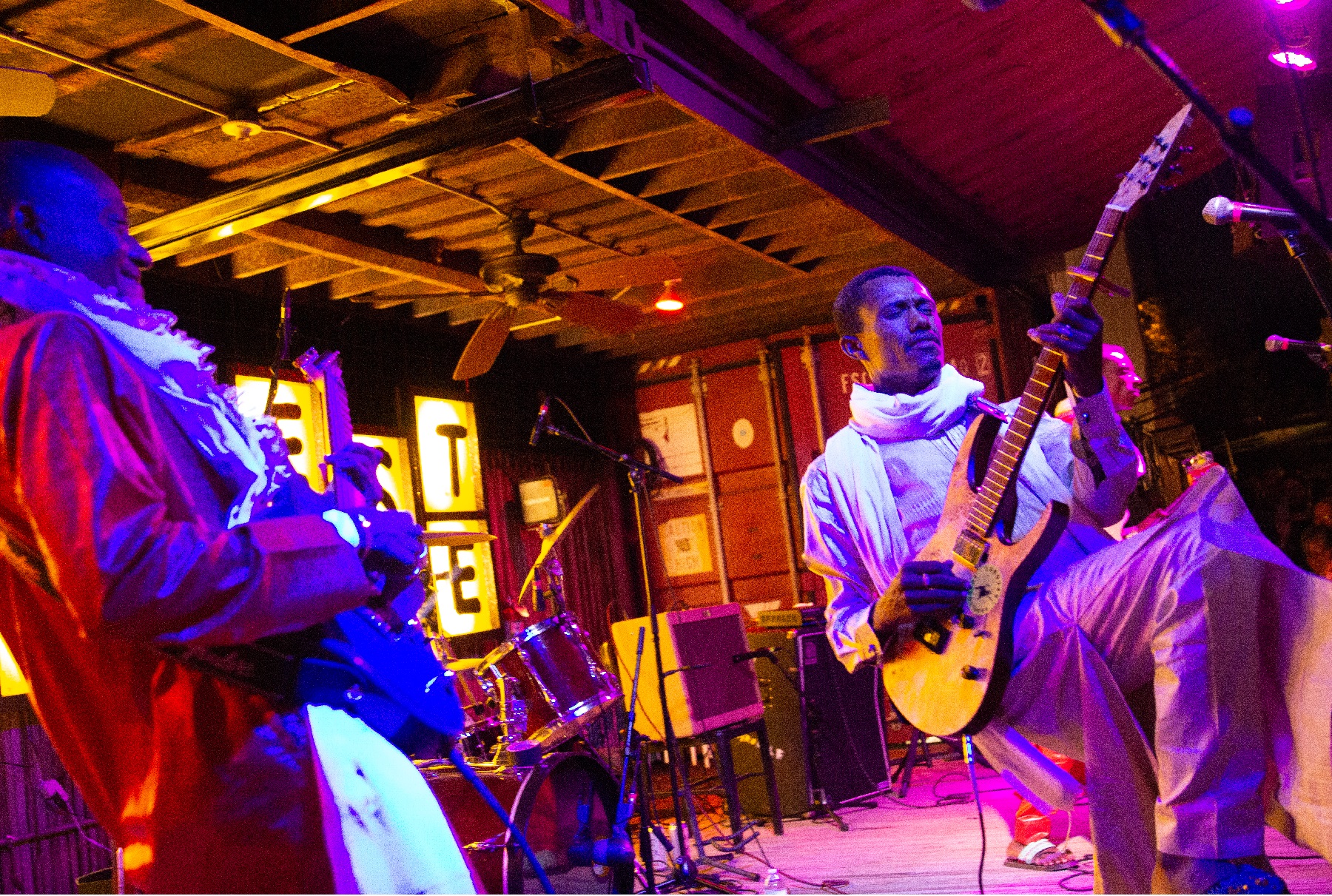
While the two-guitar, bass, and drum lineup was conventional, the sounds that emerged as they layered cascades of electric notes over galloping rhythms were nigh otherworldly. Something about the weaving guitar arpeggios created a whole greater than the sum of the parts. After a while, the various overlapping overtones created a kind of aural illusion of other sounds, something several listeners commented on. “I thought I heard harmonicas,” exclaimed one friend, and I did too. Most importantly, the sweep of sound and rhythm proved irresistible to the crowd, who collectively threw their hands up after each tune and gave perhaps the weekend’s loudest roars of approval.
With Etran de L’Aïr not being your typical Goner band (is there such a thing?), Ives was relieved to see them win over the crowd. “After seeing them completely destroy that Growlers stage, I was super excited to see what would happen,” he says. “And then when everybody just completely embraced it and was completely into it, it rejuvenated my whole sense of why we do this thing and how great the audience is at Gonerfest. And I had a whole funny conversation with with a friend about that, about how he was not a ‘world music’ fan. Now, he’s open to it. This was the first world music band that he likes.”
Ladies’ Night
Without any particular agenda in mind, many festival-goers independently singled out the amazing women in the various Gonerfest bands this year. It was a notable, if low-key, contrast to other festivals’ less diverse lineups. Many raved about Py Py‘s co-vocalist and multi-instrumentalist, Annie-Claude Deschênes, whose magnetic presence drew the crowd under her spell, especially when she had fans hold her mic cable aloft as she made her way from the stage to the bar and back.
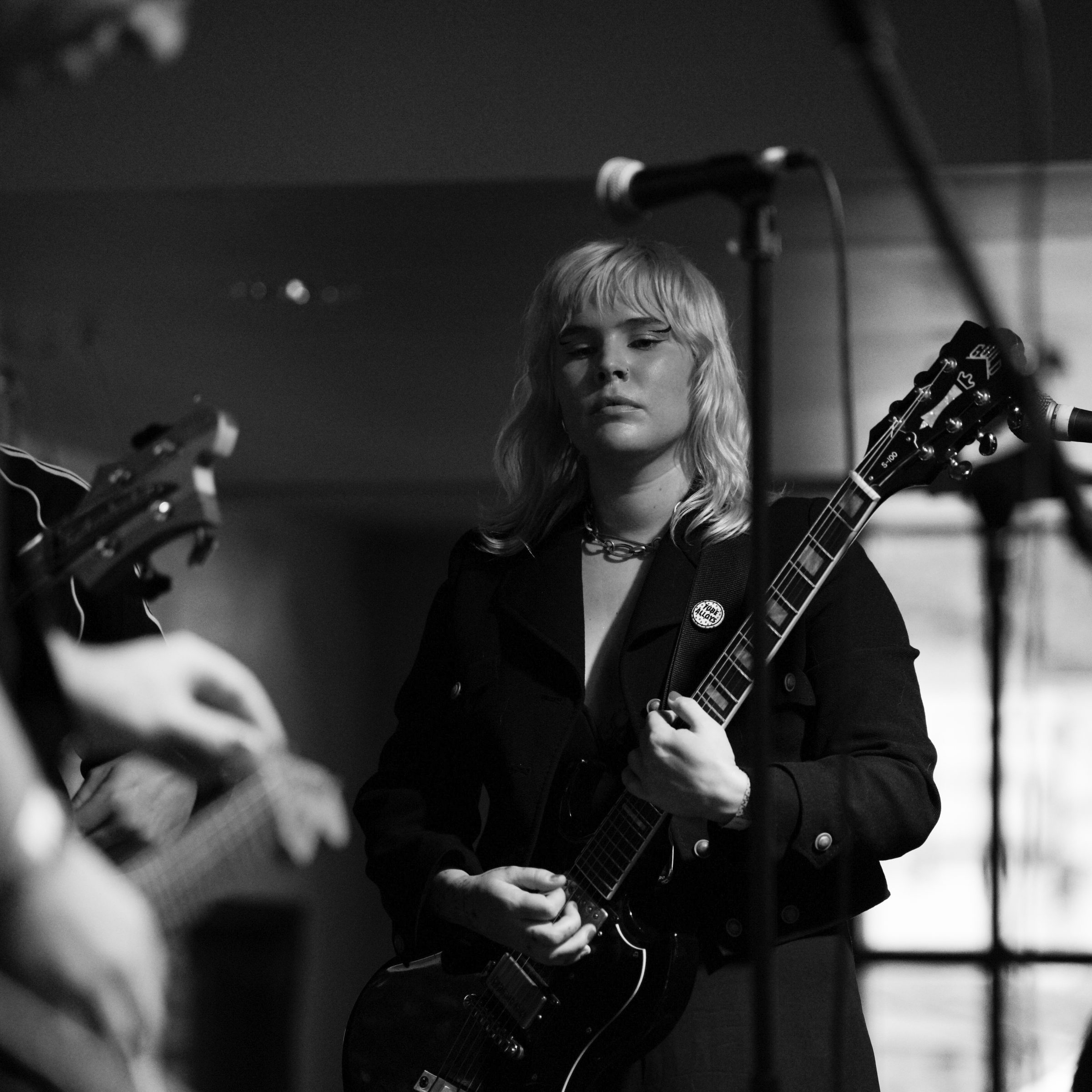
There was also the charismatic charm of Okmoniks’ Helene, noted above. And one friend raved about “that woman playing the Guild SG [guitar]” in Tube Alloys, an L.A. band named after the U.K.’s secret World War II nuclear weapons development program. Given their mastery of fuzz/crunch, the name is appropriate, fueled by their co-ed lineup.
Meanwhile, Angel Face, Japan’s latest purveyors of classic punk sneer-and-shout riffs, were powered by the unrelenting attack of their female drummer, Reiko. With punk/D.I.Y./indie attitudes seemingly more inclusive than ever, strong women players would appear to be par for the course in today’s Gonerfest universe.
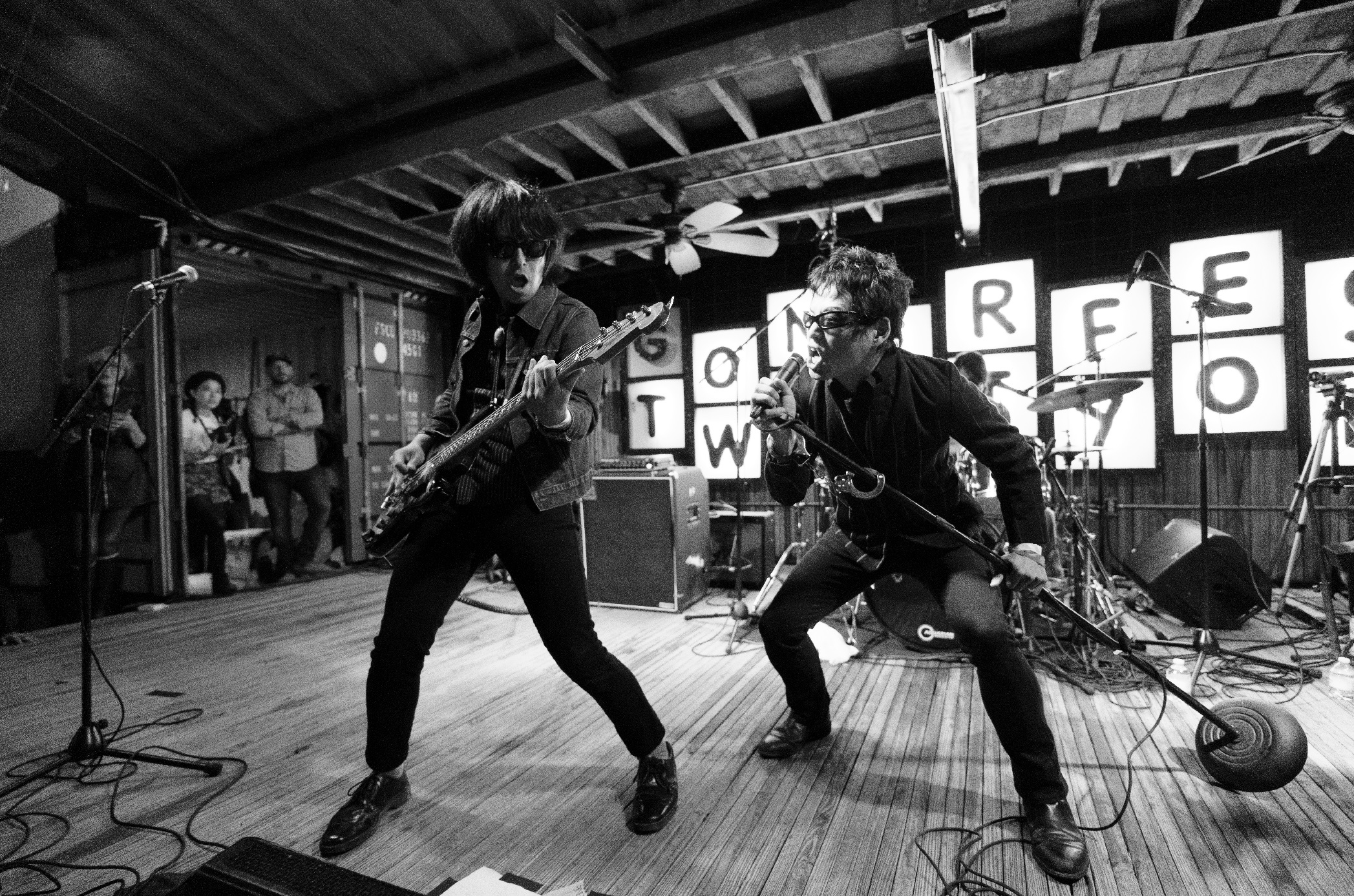
All this barely scratches the surface, of course. In answer to the query, “What just happened?” the best answer is likely, “You had to be there…” And, as Ives notes, right there at Railgarten is likely where Gonerfest will be for the foreseeable future. “We were slightly up in terms of ticket sales this year,” he says, “but there’s not really any room to grow. I think we’re basically at capacity for the space. But that feels like a good spot to be in. We were still able to offer day passes for all three nights. So it didn’t feel like we were leaving anybody out, but it also felt like we were maximizing the space and, you know, maximizing the good feelings from everybody there.”

